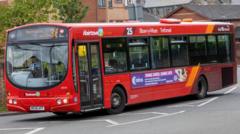Will First Cymru Bus Drivers Strike for Two Months?

Published: 2025-11-10 22:00:19 | Category: wales
The ongoing pay dispute involving bus drivers in south and west Wales has escalated, with industrial action set to commence on 20 November 2023. First Cymru drivers, represented by the Unite union, will strike continuously for two months, culminating on 21 January 2024, in response to stalled negotiations over back pay and low wages compared to competitors. This strike will significantly disrupt services from multiple depots, affecting thousands of commuters in the region.
Last updated: 15 November 2023 (BST)
What’s happening now
Bus drivers employed by First Cymru are gearing up for a significant strike that will last for two months due to unresolved pay disputes. The strike action, initiated by the Unite union, will commence on 20 November and is expected to impact services from depots in Swansea, Port Talbot, Bridgend, Carmarthen, Haverfordwest, and Ammanford. Drivers have expressed frustration over what they perceive as the company's refusal to address back pay issues from their scheduled pay dates and the low hourly wage rates relative to other local bus services.
Key takeaways
- First Cymru drivers will strike from 20 November 2023 to 21 January 2024.
- The strike follows stalled negotiations over back pay and low wages.
- Current hourly pay for First Cymru drivers is £13.40, lower than competitors.
Timeline: how we got here
The timeline leading up to the strike is marked by key events in the ongoing dispute:
- September 2023: Initial discussions about pay adjustments commence.
- October 2023: Negotiations stall, leading to increased tensions between drivers and management.
- November 2023: Unite union announces the strike will begin on 20 November, after failed attempts to resolve the issue.
What’s new vs what’s known
New today/this week
The Unite union has formally announced the dates for the strike, indicating a two-month period of industrial action that will affect numerous bus services across south and west Wales. This announcement comes after failed negotiations and growing dissatisfaction among drivers regarding pay conditions.
What was already established
Prior to this announcement, it was known that First Cymru drivers were frustrated with their pay and working conditions, which they believed were not reflective of the demands of their roles. The drivers currently earn £13.40 an hour, significantly less than their counterparts at Cardiff Bus (£15.00) and Newport Transport (£14.50).
Impact for the UK
Consumers and households
The strike will inevitably disrupt daily transport for thousands of commuters in the affected areas. This disruption may lead to increased reliance on alternative transport methods, such as cars or taxis, which could result in higher travel costs for households. Additionally, the uncertainty surrounding the timetable and frequency of bus services may add to the stress for those dependent on public transport.
Businesses and jobs
Local businesses may also feel the impact of the strike, as reduced bus services could deter customers who rely on public transport to reach their shops. Furthermore, employees working in sectors reliant on public transport may face challenges in commuting, potentially affecting job attendance and productivity.
Policy and regulation
This dispute highlights ongoing issues in the transport sector regarding fair pay and working conditions. The Welsh Government may need to intervene if the dispute continues, particularly considering the importance of public transport in achieving environmental and economic goals. Upcoming discussions may focus on establishing minimum wage standards across the industry to prevent similar disputes in the future.
Numbers that matter
- £13.40: Current hourly wage for First Cymru drivers.
- £15.00: Hourly wage at Cardiff Bus, highlighting the pay disparity.
- £14.50: Hourly wage at Newport Transport, another competitor in the region.
- 2 months: Duration of the planned strike action from 20 November 2023 to 21 January 2024.
- 6: Number of depots affected by the strike across south and west Wales.
Definitions and jargon buster
- Unite union: A trade union representing various sectors, including transport workers, advocating for workers' rights and pay.
- Back pay: Money owed to employees for work done in the past, typically related to wage adjustments or contractual agreements.
How to think about the next steps
Near term (0–4 weeks)
In the immediate future, commuters should prepare for service disruptions starting 20 November. Alternative transport arrangements should be considered to minimise inconvenience.
Medium term (1–6 months)
If negotiations do not resume or if the strike extends beyond 21 January, there may be a need for local authorities to intervene to facilitate a resolution. The potential for further industrial action in the future could arise if drivers feel their concerns are not adequately addressed.
Signals to watch
- Updates from the Unite union regarding negotiations or further strike actions.
- First Cymru's response to drivers' demands and any proposed resolutions.
- Public sentiment and commuter feedback regarding the strike and its impact.
Practical guidance
Do
- Plan alternative transport methods for daily commutes.
- Stay informed about updates from local news regarding the strike.
- Consider carpooling with colleagues or friends to reduce travel costs.
Don’t
- Do not rely solely on bus services during the strike period.
- Avoid confrontations with drivers or staff regarding the strike; they are exercising their rights.
- Don’t assume the strike will end without significant negotiation; monitor developments closely.
Checklist
- Have alternative transport plans ready for the strike period.
- Keep abreast of any updates or changes in the strike schedule.
- Evaluate personal transport expenses and adjust budgets accordingly.
- Consider engaging with local representatives or authorities if the strike significantly impacts you.
- Stay connected with community discussions regarding the strike and its implications.
Risks, caveats, and uncertainties
The situation remains fluid, with the potential for negotiations to resume at any time. There is uncertainty regarding how long the strike will last and whether it will lead to substantial changes in pay or working conditions. Additionally, public sentiment towards the strike may shift as commuters experience the impact of the disruptions, which could influence negotiations.
Bottom line
The upcoming strike by First Cymru drivers is poised to disrupt public transport significantly in south and west Wales, highlighting ongoing issues around pay and working conditions within the industry. As the situation evolves, it is crucial for commuters and stakeholders to stay informed and prepared for potential changes in service availability.
FAQs
What is the reason for the First Cymru bus drivers' strike?
The First Cymru bus drivers are striking due to stalled negotiations over back pay and low wages, which they believe do not reflect industry standards.
How long will the strike last?
The strike is set to last from 20 November 2023 to 21 January 2024, affecting services throughout this period.
What impact will the strike have on commuters?
Commuters are likely to experience significant disruptions in bus services, necessitating alternative transportation arrangements during the strike period.



